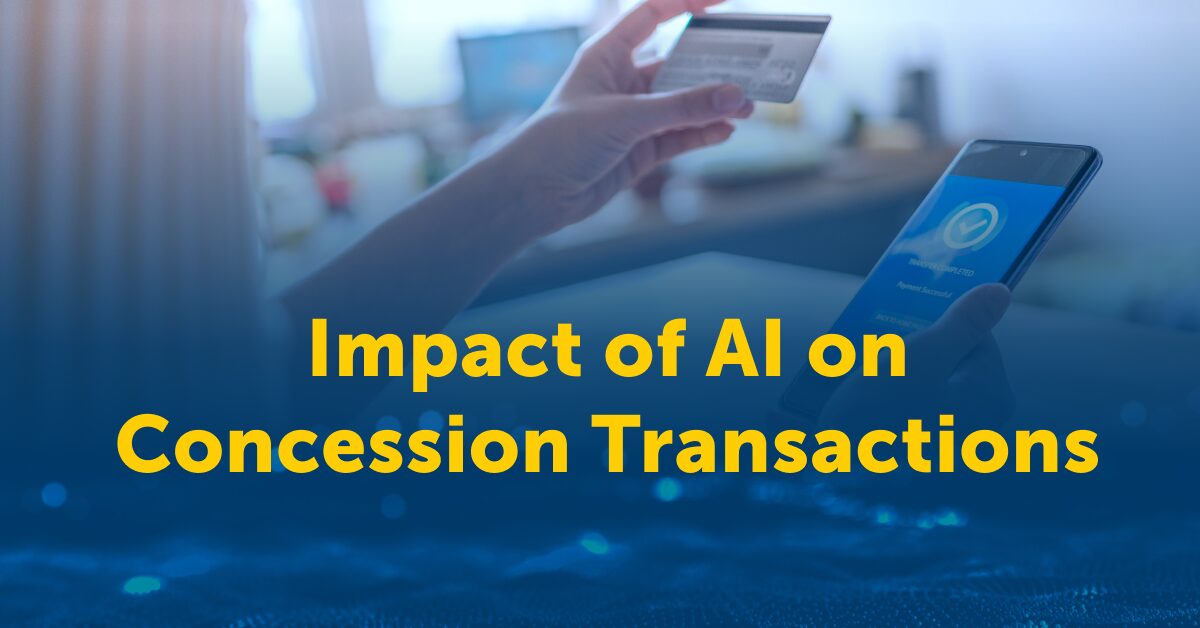AI in Concession Transactions: Preventing Fraud and Revenue Leakage

In concession transactions, fraud and revenue leakage are not just minor setbacks—they’re significant challenges that can impact both the bottom line and customer loyalty. With the increasing volume and complexity of these transactions, businesses often struggle to maintain control and ensure accurate revenue capture. Traditional methods simply don’t keep up with the pace or sophistication of modern fraud tactics.
AI is changing the game. By leveraging machine learning and data-driven insights, AI offers businesses a powerful way to detect fraud in real-time and prevent revenue leakage before it happens. We explore how AI is helping businesses optimize concession transactions, improve operational efficiency, and protect profitability.
Challenges in Concession Transactions
Fraud and revenue leakage are significant risks for businesses in concession operations, whether in ticketing, retail, or services. As transaction volumes rise, legacy systems and manual processes are increasingly unable to effectively identify fraud or ensure accurate revenue capture. These vulnerabilities can result in costly losses and operational inefficiencies, making it essential to adopt more advanced solutions.
Key challenges include:
- Revenue Losses: Manual systems are prone to errors, leading to missed revenue opportunities.
- Fraud Vulnerability: Outdated fraud detection methods are easily bypassed by sophisticated fraud tactics.
- Operational Bottlenecks: Manual checks slow down processes, leading to inefficiency and higher operational costs.
- Damaged Customer Trust: Fraudulent activities and inaccurate transactions diminish customer loyalty and satisfaction.

Want guidance from an AI expert on how to implement AI in your business? Contact Fusemachines today!
How AI is Revolutionizing Fraud Detection in Concession Transactions
AI is fundamentally changing how businesses tackle fraud and revenue leakage in concession transactions. Unlike traditional methods that rely heavily on human oversight or outdated software, AI utilizes machine learning, pattern recognition, and real-time data analysis to proactively address these challenges. AI can analyze vast amounts of transactional data almost instantaneously, identifying hidden patterns and anomalies that would be impossible for humans to detect manually.
Here’s how AI is making a significant impact on fraud detection and revenue leakage prevention:
- Real-Time Fraud Detection
AI continuously scans transactions and identifies irregularities as they happen. Through machine learning algorithms, AI can detect patterns of fraudulent behavior, such as multiple ticket purchases from a single IP address or unusual spending habits, enabling businesses to act quickly and prevent financial losses.
- Adaptive Learning
One of AI’s key strengths is its ability to evolve. As fraud tactics become more sophisticated, AI systems learn from new data, constantly refining their detection models. This adaptability makes AI a future-proof solution, able to keep up with emerging fraud schemes without requiring constant reprogramming or manual updates.
- Predictive Analysis
AI doesn’t just detect fraud—it can predict it. By analyzing historical transaction data, AI can forecast potential areas of vulnerability and alert businesses to take preventative measures. For example, AI can predict periods when fraud risks are higher (e.g., during sales or promotions) and suggest stronger monitoring during those times.
- Automation of Repetitive Tasks
Many fraud detection tasks, such as validating transactions or monitoring for anomalies, are highly repetitive and prone to human error. AI automates these processes, ensuring more consistent and accurate results while freeing up human resources for more complex decision-making.
- Anomaly Detection
Through unsupervised learning, AI systems can identify subtle and unusual behaviors in transaction data that don’t fit into typical patterns. For instance, AI can flag sudden changes in purchasing behavior or transactions that fall outside of established patterns, such as unusually large purchases or irregular refunds.
- Enhanced Risk Scoring
AI models can generate real-time risk scores for each transaction, which can be used to flag potentially fraudulent activity based on a range of factors, such as transaction history, payment methods, customer behavior, and more. Businesses can then make data-driven decisions to either approve, decline, or further investigate these transactions.
- Reducing False Positives
Traditional fraud detection methods often generate a high number of false positives, which can result in legitimate transactions being flagged incorrectly. AI’s ability to analyze data contextually and in-depth helps reduce these false alarms, ensuring that customers aren’t unnecessarily impacted by declined transactions, while still maintaining high levels of security.
- Fraud Prevention Across Channels
In today’s multichannel environment, fraud can occur across various touchpoints—online, in-store, or through mobile apps. AI enables businesses to monitor and prevent fraudulent activities across all these channels simultaneously, ensuring comprehensive protection against fraud regardless of how the transaction occurs.
- Improved Customer Experience
AI-powered fraud detection can enhance the customer experience as well. By preventing fraud and ensuring more secure transactions, customers experience fewer interruptions, declined transactions, or account freezes. Moreover, AI’s ability to process transactions more quickly can lead to faster, smoother customer interactions, improving overall satisfaction.
Benefits for Decision-Makers
Integrating AI into concession transactions offers significant advantages for senior managers and executives, helping streamline operations and drive profitability. By leveraging AI’s capabilities, decision-makers can:
- Boost operational efficiency by automating routine tasks.
- Cut costs by reducing fraud and minimizing revenue leakage.
- Make data-driven decisions with real-time insights.
- Increase profitability through more accurate revenue capture.
- Scale operations seamlessly as transaction volumes grow.
- Ensure compliance with automated tracking and reporting.
- Gain a competitive edge by enhancing security and customer trust.
Bottom Line
As the industry continues to evolve, AI will remain a cornerstone of fraud prevention and operational optimization. It’s time to harness the power of AI and take your concession operations to the next level.

Want guidance from an AI expert on how to implement AI in your business? Contact Fusemachines today!


